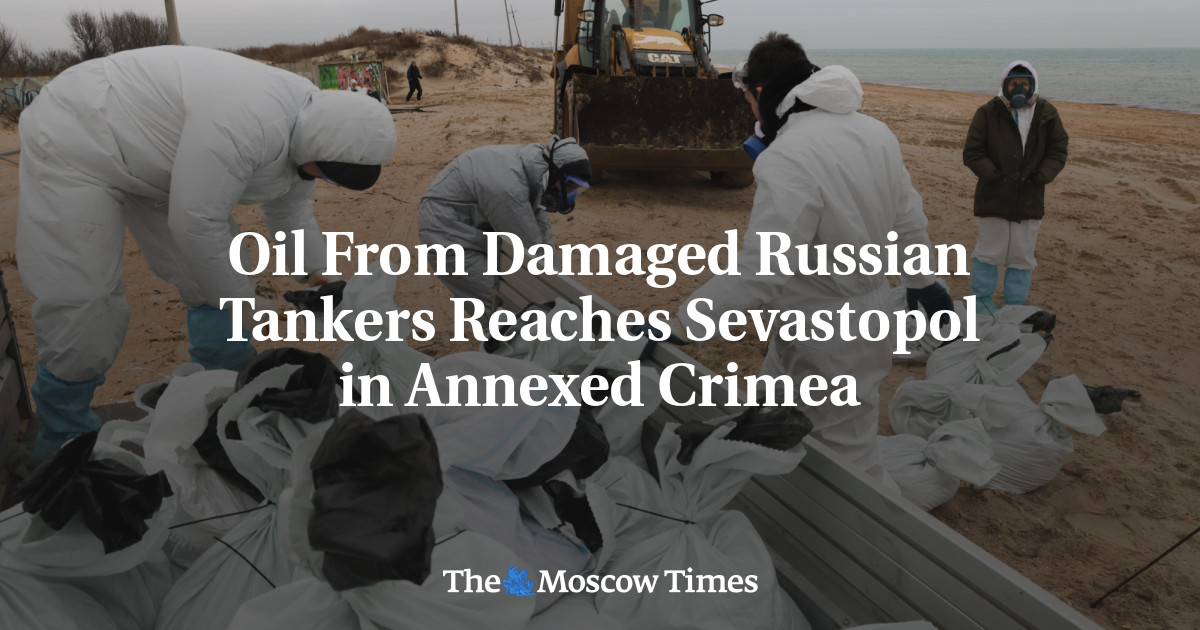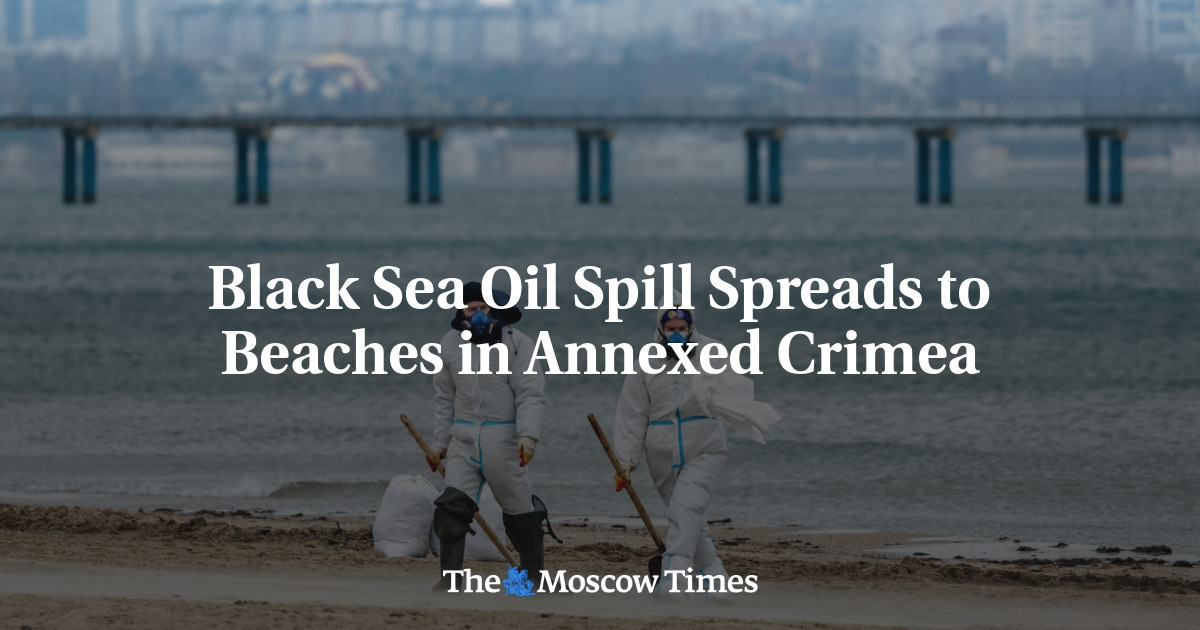AMSTERDAM — “My point is to talk to everyone,” says Anastasia Shevchenko.
After losing a child while under house arrest in Russia and witnessing the atrocities of the Kremlin’s invasion of Ukraine, the exiled civil activist sees it as her mission to speak to Russians across the political spectrum and win over as many minds as she can.
Shevchenko was visiting the Dutch capital for a screening of “Anastasia,” Sarah McCarthy’s Oscar-shortlisted documentary that chronicles one of the most painful episodes of her life.
In January 2019, the activist was the first person to be charged under Russia’s law on “undesirable” organizations over her work with Open Russia, a pro-democracy political organization founded by exiled businessman Mikhail Khodorkovsky.
That month, while Shevchenko was under house arrest, her 17-year-old daughter Alina, who had a disability, died alone in the hospital after two days in intensive care. Investigators allowed Shevchenko to see her daughter only a few hours before she passed away.
“Anastasia” follows Shevchenko, her mother Tamara and her children Vlada and Mikhail as they travel south to the Black Sea coast to scatter Alina’s ashes in the sea in a final goodbye.
“I wouldn't like to share my story, actually,” Shevchenko tells The Moscow Times.
“Every time I watch the documentary I feel embarrassed because it's very private; it's like going out of your comfort zone every time. But I decided to be open and sincere.”
It is this openness and willingness to speak frankly about her life as a prisoner of conscience that play a key part in her activism today.
“I think it helps me to be closer to people, to feel what they feel, to help and to feel compassion and empathy toward those who are in prison [and those] who die in this war,” she said. “It's very hard from a psychological point of view … but that's my choice.”
Shevchenko fled Russia with her children in the summer of 2022, understanding that her vocal criticism of the invasion of Ukraine put her at risk of prosecution under wartime censorship laws. The family now lives in Vilnius, Lithuania.
The activist, who has a Ukrainian surname and relatives still living in Ukraine, said she had expected that Putin would invade the country. Over two years into the war, it is now up to Russian citizens, she said, to accept their collective responsibility for it.
“I don't want Ukraine to be responsible for the end of this war. I want us to be responsible for the end of this war because it's our country [that started it],” she told The Moscow Times.
“Unfortunately, sometimes we just need to take responsibility,” she said, describing much of Russian civil society as “immature” and needing to accept reality.
“Putin will never take this responsibility, I'm afraid, nor will the people around him.”
Today, a large part of Shevchenko’s work is spent writing letters to Russian political prisoners and Ukrainian prisoners of war. She said she writes weekly letters to several hundred people in Russian prisons.
Writing to Ukrainian prisoners of war is especially important, she said, as their own relatives cannot write to them without a Russian telephone number, bank account and passport.
These prisoners, who are typically young men around 20 years old, are kept “in the worst conditions you can imagine” and have often been sentenced to lengthy prison terms, Shevchenko said.
Besides longing to hear from their families, Shevchenko said many of them ask her to keep them updated on topics like cryptocurrency and football.
“They usually ask about Elon Musk. They were arrested two years ago — they think he's a good guy,” she said.
Her own experience of living under house arrest for two years, with no access to information from the outside world, has underscored the importance of writing to prisoners, she said.
“What does it mean to be under arrest? It means you are isolated from the whole world. And you are in this bubble with only judges, police, prosecutors and investigators. Every day they tell you that you are a criminal, you are a threat to the [state’s] defense capacity, you are a threat to the Constitution. And you start believing it somehow,” she said.
“But then you come home with a headache after these hearings and start reading postcards where people say, ‘We express our support, it's going to be okay’ … You start believing that actually, there’s not something wrong with you, there’s something wrong with the people around you, these prosecutors and police.”
She also believes that reaching out to members of Russia’s law enforcement apparatus is a key step in swaying these people to the opposition’s cause.
“It’s almost impossible, but we need to work on it, because this regime is based on siloviki. As soon as they stop supporting Putin, it's going to be the end of regime,” she said.
Shevchenko said she learned how to talk with law enforcement workers during her time under house arrest, when she would regularly meet with investigators and police.
While these people initially threatened and abused her, they gradually opened up to her and would have conversations about politics and everyday life.
“Sometimes they even showed me videos with [Kremlin critic Alexei] Navalny. I was not allowed to watch it, but they actually were watching it together with me,” she said.
“There is, of course, a lot of human in them,” she said. “You just need to find a way to reach out.”
“After [the Crocus City Hall] terror attack in Moscow, when I watched this horrible video with a police officer cutting [a suspected gunman’s] ear [off], I felt like, ‘No, it's impossible. I will never be able to talk to people like that.’ But they are not all the same and I don't give up,” she said.
Shevchenko said she continues to follow many law enforcement and security officers on social media and stays in contact with them.
“The people I met were not Putin's fans,” she said. “If something changes in my country, imagine we all come back. These people will not disappear. You need to live in the same homes and to communicate with them.”
She follows a similar principle when speaking with the wives and mothers of mobilized Russian soldiers. These women, who have for months called on the Kremlin to return their sons and husbands home, are not unanimously against the war itself.
“I see everyone as an ally. Any kind of protest is good,” she said. “We are not in a situation where we can choose: ‘Okay, you are protesting in a good way and you are protesting in a not-very-good way.’ If you protest, you are my hero.”
Keeping dialogue open is necessary for reconciliation in Russian society after the end of the war and Putin’s rule, Shevchenko argues.
“It's not going to be a beautiful Russian future,” she said, referring to the term coined by the late Kremlin critic Navalny to describe the free, democratic Russia that he and his supporters envisioned.
Shevchenko is a member of the Anti-War Committee of Russia, a movement of Russian public figures opposing the war and Putin’s regime and supporting the unity of anti-war and pro-democracy Russians.
During her visit to the Netherlands, she met with Dutch Foreign Ministry officials to discuss visas for politically active Russians and support measures for Russian political prisoners and their families.
Sitting in an Amsterdam cafe, Shevchenko noted the disparities between the Netherlands, a democratic country with one of the highest quality of life ratings in the world, and Russia, where citizens are not free to voice their political opinions and are not protected from attacks or natural disasters.
“I still dream about a happy country [that’s] good for the citizens where the parliament will take care of people one day. But of course, it's going to be a very turbulent time [before then].
“I had a conversation recently with a guy from Moscow, and he told me, ‘I'm ready to be poor, I'm ready to live in the 90s or worse, but I just want my country to be free.’ That's the moment where you realize that freedom is much more important than money and everything else. I hope it's not only about one guy from Moscow, that we are going to do it together,” she said.
“People should understand that the main responsibility of government is not to look for an external enemy, but to take care of citizens and to provide them a better life.”
Despite the long, challenging road ahead, Shevchenko said that younger generations of Russians have given her hope for the country’s future.
Her daughter Vlada, now a university student in Lithuania, shares her mother’s political convictions.
“Putin should be in Russian prison like our political prisoners,” Vlada said at a talk after the documentary screening hosted by Amnesty International.
Shevchenko’s work to support and nurture fellow activists and political prisoners has made her a maternal figure for some.
“There are some political activists who call me mom. My mom is very irritated about it. Like, “How dare he call you mom if you are not his mom?’” she said. “Russian propaganda last month published an article: ‘A Mother of Russian Immigrants.’ This is about me,” she said.
“Why? I don't know. But I like it. I'm ready to take care of other people and I love people. Why not?”
 (1).png)
 8 months ago
29
8 months ago
29













